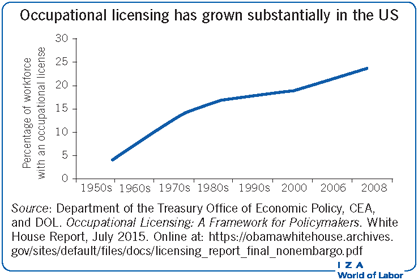Elevator pitch
Since the end of World War II, occupational licensing has been one of the fastest growing labor market institutions in the developed world. The economics literature suggests that licensing can influence wage determination, the speed at which workers find employment, pension and health benefits, and prices. Moreover, there is little evidence to show that licensing improves service quality, health, or safety in developed nations. So, why is occupational licensing growing when there are such well-established costs to the public?

Key findings
Pros
Wage premiums resulting from occupational licensing attainment are positively associated with the stringency of licensing requirements.
Gaining employment in a universally licensed occupation has been shown to increase hourly earnings compared to unlicensed individuals with similar education and skills.
Licensing raises long-term earnings and employment opportunities for low-income occupations.
Certification by government can provide information about the quality of the practitioner while reducing the monopoly effects of licensing.
Cons
By making it more difficult to enter an occupation and move across political jurisdictions, employment opportunities may be reduced in licensed occupations.
Licensing raises the prices of services with no clear demonstrated benefit in overall quality.
The additional requirements needed to earn licensure may steer low-skilled or low-income workers into even lower-paying but more accessible jobs that do not require a license, such as janitors or waiters.
Wage premiums resulting from licensing are primarily due to reductions in competition as well as perceived higher quality of service, which may be associated with increased income inequality.